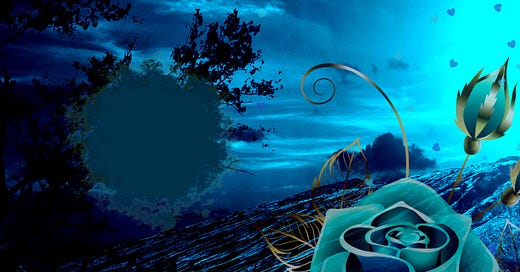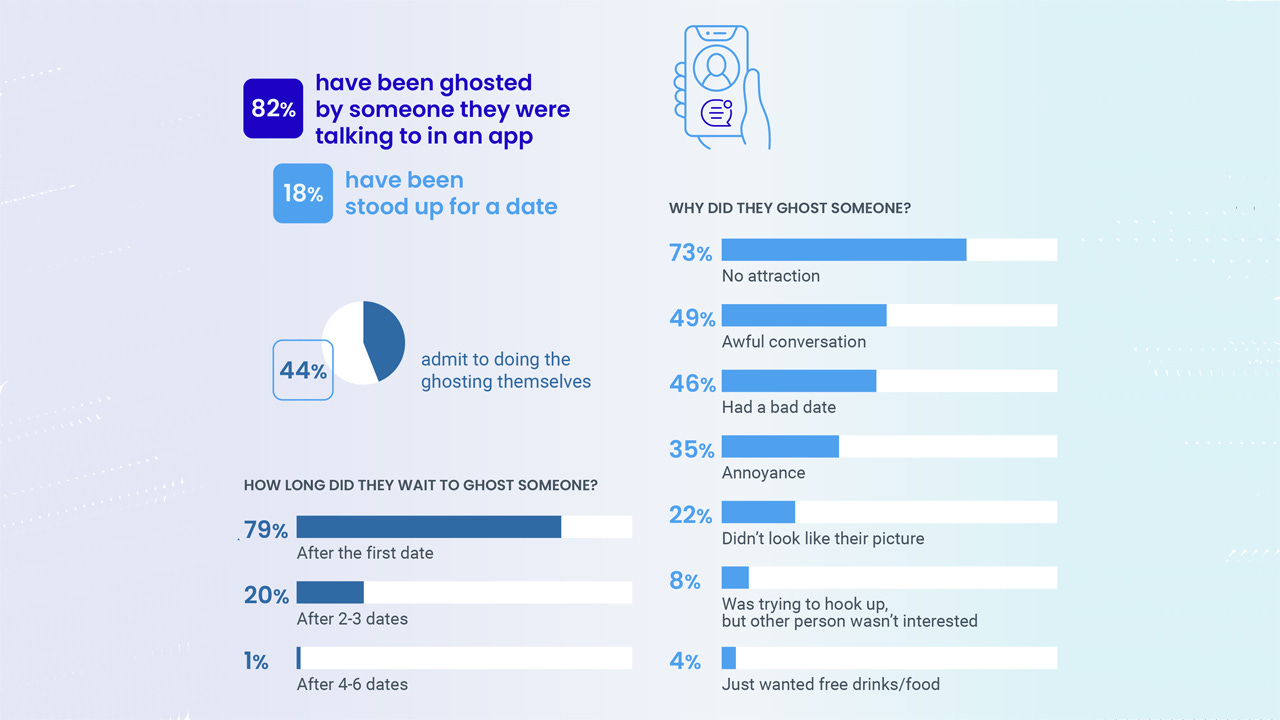Dating in doubt is hell. The digital desire algorithms of dating apps have made the experience of being alone in the world a 24/7 operation. Discoveries and discourse are validated in the vapor vertigo of abstraction, anonymity, and avatars mandating a mockery of empathy not maliciously but reactively. The survival instinct is primal: survive sympathetic simulations where disrespect moistly breeds in pockets and chirps tropically from palm-sized screens with the promise of paradise echoing with emptiness.
In the chaos of noise that is the atmosphere of the planet that is love, sudden silence is asphyxiation aggravated by algorithmic apathy. Forever after, the names of the obsolete blink from the same glass graves we use to order food, check the weather, and share our desired personalities. We each wield the power of a polytheistic poltergeist capable of resurrecting any sorry ghoul buried at one of the ruined temples where we prayed before. Unless that ghoul decides to ghost us.
Once a moaning electromagnetic entity of unfinished business captive to strict square footage, ghosts now have the magical power to haunt us in perpetuity in the paranormal phenomenon we call “ghosting.” As Wikipedia tells us:
Ghosting, also known as simmering or icing, is a colloquial term which describes the practice of ending all communication and contact with another person without any apparent warning or justification and ignoring any subsequent attempts to communicate.
In one survey, 82% of people said they had been “ghosted” by someone from a dating app. With an estimated 320 million people using dating apps, that means roughly 262 million people have met someone who talked to them and learned about them before subsequently disappearing at an atomic level in the same way that a body is cremated. A first date is no indicator of a prospective partner’s permanence on the material plane: more than three-quarters of people have been ghosted after a first date.
The singular truth of online dating is that you are meeting strangers from the internet. Anything could happen and nothing can be controlled. The minutes before meeting a summoned stranger, we search a gallery of faces both expressed and displayed in the screen in our hand. What emotion and what expression is real and what is for display? What presence will become permanent and what will become null and void?
The Gueremantes Way, the third volume of Marcel Proust’s epic series, The Search of Lost Time (1913-1927), goes deeper into what “ghosting” feels like when our narrator’s friend, Robert de Saint-Loup, a man stationed far away from his lover, suddenly stops receiving letters from her after an argument. The silence between these two lovers is torturously absolute. The narrator observes the woeful effect that ghosting has on his friend as Saint-Loup suffers the totalitarian torment of disconnection.
Proust’s observations about ghosting, true about letter writing and phone calls as it is true about texting and dating apps, offer an evergreen glimpse of what’s experienced by not the ghost but the ghostee. Rest assured that even in Proust’s time, the experience is commonplace and, angled correctly, poetic. If the days of your haunting are long gone, be grateful: A naked heart is a beautiful and fragile thing.
Here are Proust’s seven symptoms of getting ghosted:
1. Ghosting Causes Anxiety.
It has been said that silence is strength; in a quite different sense it is a terrible strength in the hands of those who are loved. It increases the anxiety of the one who waits.
2. Ghosting is a Wall.
What barrier is so insurmountable as silence?
3. Ghosting Causes Paranoia.
What have I done that she should be so silent?
4. Ghosting is a Cage.
That kind of silence is in itself a prison… [an] interposed slice of empty atmosphere through which nevertheless the visual rays of the abandoned lover cannot pass. Is there a more terrible form of lighting than that of silence, which shows us not one absent love but a thousand, and shows each of them in the act of indulging in some new betrayal?
5. Ghosting is Fantasy.
[In] a phantom oasis of tenderness, he found himself once more toiling across the real desert of silence with no end.
6. Ghosting is Purpose.
He suffered in anticipation… At all events, this hope that his mistress would return gave him courage to persevere in the rupture, as the belief that one may return alive from the battle helps one face death.”
7. Uncertainty is Not Love.
His uncertainty kept him in a state which, linked with the memory of the woman herself, was akin to love.
The Sins of Silence
Ghosting, as Proust’s last lesson tells us, is a state of doubt in which the sensation of crumbling confidence becomes a rush of adrenaline that may feel like love. Proust shows the designs of what we mistake for love in our vulnerable and hopeful search for it. In the primordial ectoplasm of emotion, the evolution love takes is different in every era.
Ghosting leaves us with a handful of symbols as souvenirs, texts and half-finished conversations, period pieces of abstract images and portraits gray with the illusion of intention, names bound to be more form than figure and more feeling than face.
The ghosts in our lives gleam in platinum parallels performing deep within the canyons we leave behind as we climb out of the darkness we mistook for light.
To ghost is fear: we fear making any feeling real, because we don’t want to feel any real feeling if something may not be real for long. The only thing that really matters for the haunted souls we become and the sensational spirts we summon behind us is that we become ghosts with grace.
Happy Valentine’s Day.







To become ghosts with grace is truly an art form worth mastering.
The digital interfaces change, but I'd bet the practice is ancient. There were definitely mfs back in 1791 who hit and quit, then never put quill to parchment in response to their paramour's missives 😄